Government statisticians sliced a cross-section through England and Wales on Tuesday and exposed a place that is healthy, increasingly multi-faith and more likely than ever to be talking in Polish, Hindi or Urdu around the dinner table.
The results of the 2011 census of 56 million people, the most thorough analysis yet of how life changed in the first decade of the 21st century, revealed that our towns and cities are global villages with an extra 2.9 million foreign-born people living in England and Wales since 2001 – most from India, Poland and Pakistan – and an additional 1.1 million Muslims, bringing the total to 2.7 million.
Christianity, or at least the number identifying themselves as followers of the largest religion, is on the slide with more than 4 million fewer saying they followed the church than in 2001.
The march of the faithless has also continued with 14.1 million people, about a quarter of the entire population, saying they had no religion at all, a rise of 6.4 million over the decade.
Claiming the title for the most godless places were the student enclaves of Brighton and Norwich, where 42% said they had no religious affiliation, closely followed by Blaenau Gwent, Caerphilly and Rhondda in south Wales, where community leaders said unemployment and a breakdown in community values had loosened religion's hold. Even the number of people jokingly professing to be Jedi Knights more than halved.
The Office of National Statistics census director, Guy Goodwin, said the snapshot of life taken on 27 March 2011 was "a picture of big change since 2001 and a population that is increasingly diverse".
Buried in the statistics, changing social mores were writ large. The number of married people fell below 50%; there were 400,000 more single parents and 504,000 extra cohabiting unmarried couples. Four out of five people said they were in good or very good health but the impact of an ageing population loomed, with 2.1 million people reporting that they were giving 20 hours or more of unpaid care for someone with an illness or disability, almost half a million more than in 2001.
Growing economic hardship figured with 1.8 million of the economically active population unemployed and 2 million households overcrowded – half a million more than in 2001.
But it was the impact of the rising population of people born abroad and the changing face of religion in England and Wales that grabbed attention. On the day Church of England bishops met to discuss the rejection of plans to ordain women bishops, secularists said the trend away from Christianity was evidence that conservative church attitudes did not impress the public.
The British Humanists Association (BHA) had encouraged people to tick the "No religion" box and said the fall was "astounding". It has calculated that Christians could be in a minority by 2018.
Christianity remains the largest religion in England and Wales with 33.2 million followers, or 59% of the population. The Church of England said the figures "confirm we remain a faithful nation", but adding that the fall of 4 million in those choosing to see themselves as Christians was "a challenge".
Rev Arun Arora, director of communications for the Archbishops' Council, said that one explanation may be that fewer people identify as "cultural Christians" – "ie those who have no active involvement with churches and who may previously have identified as Christian for cultural or historical reasons. They indicate a changing pattern of religious life in which traditional or inherited identities are less taken for granted than they used to be."
Andrew Copson, BHA chief executive, said: "This is a really significant cultural shift. It is time that public policy caught up with this mass turning away from religious identities and stopped privileging religious bodies with ever-increasing numbers of state-funded religious schools and other faith-based initiatives."
Islam, the next biggest religion, has a growing base. People who identified themselves as Muslims in 2011 numbered 2.7 million, up from 1.55 million in 2001. Muslims now make up 4.8% of the population, compared with 3% in 2001. There were 817,000 Hindus, 423,000 Sikhs, 263,000 Jews and 248,000 Buddhists.
Farooq Murad, secretary general of the Muslim Council of Britain, said the figures showed Muslims were "playing a significant part in the diversity of Britain" but he added that said the relatively low number would be a reality check for supporters of the far right "who try to alarm the country that Britain is being overrun by Islam".
Julian Bond, director of the Christian Muslim Forum, said the figures reinforced the need to "think about the best possible way to engage with Islam and think about whether people should be having days off for Eid, how Ramadan is accommodated and how religion is taught in schools".
The number identifying themselves in the ONS's category of "white British" fell from 87.5% in 2011 to 80.5% in 2011 with the foreign-born population now close to one in eight in England and Wales.
India accounts for the largest foreign-born population, overtaking Ireland, followed by Poland with an increase of 500,000 people coming to England and Wales in the last decade, spurred by its accession to the European Union in 2004. About half of the foreign-born residents arrived between 2001 and 2011.
The largest increase in the foreign-born population was in London, where more than a third of residents were born abroad – almost a quarter were not British nationals. Britain is far from alone in this: Spain, Sweden, Belgium and Austria are among the eight EU countries that last year recorded a higher percentage of foreign-born nationals.
The ONS's use of the term "foreign-born" does not give a full picture of the changing nature of citizenship. About 60% of foreign-born residents become British citizens within five years of arrival. The figure also includes an estimated 300,000 overseas students as well as a significant minority of Britons who were born overseas, including about 250,000 children born to parents serving abroad in the armed forces.
The status of English as the main language is also changing – 1.2m households now include no adults for whom English is their main language. The census found 31,000 households in Birmingham and more than 21,000 each in Manchester and Leicester had no one resident for whom English was the main language. There were 422,000 households in this category across outer and inner London. The ONS said they had not measured the standard of English for those people who said it was not their main language.

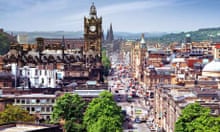
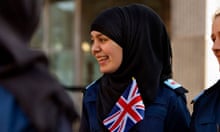


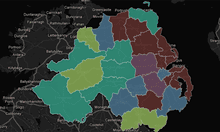
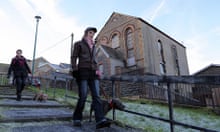
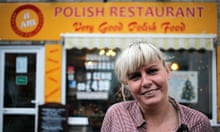
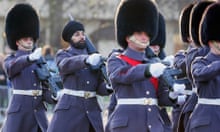


Comments (…)
Sign in or create your Guardian account to join the discussion